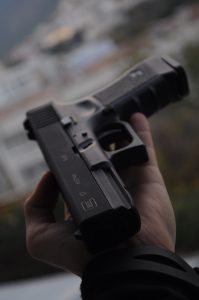The most important thing to remember during a routine police check with a legal firearm is that you should be honest, cooperative, and calm. Don’t raise the alarm. You’re carrying the firearm legally, so you have nothing to hide.
If you’re a firearm-toting model citizen, you have nothing to worry about. The problem is, the police don’t know you. If you get pulled over by the police during a routine traffic stop, you need to handle the situation appropriately to avoid any trouble.
If you are carrying a firearm legally, you should already know how to handle it appropriately in all situations, but dealing with the police can get hairy really fast. Here are some tips to keep you and everyone else around you safe.
Disclose Your Firearm
It’s always best to disclose that you have a firearm on you or within reach. As a general rule, you should never make any sudden movements and always keep your hands where the officer can see them.
Rather than gesturing or pointing, simply indicate that you have a firearm on and you tell the officer where it is. This demonstrates that you’re willing to cooperate and ensures that you don’t meet the wrong end of the officer’s gun up close and personal.
At this point, depending on your state of residence, the officer may use his own discretion when continuing with the traffic stop. He could:

- Ask you for your conceal carry permit or any license you have to carry a gun
- Tell you to leave the gun where it is and keep your hands in plain sight
- Take the gun or request that you hand him the gun so he can maintain control over the situation and keep everyone safe.
Keep in mind that the police don’t know who you are, so you can’t expect them to assume you know what you’re doing. You may have all of the reasons why owning a .45 is great, but now’s not the time to show off. His job is public safety and he will do whatever he needs to do to maintain order.
However, it’s also important to remember that unless he has probable cause, he cannot search your vehicle. Unless he strongly suspects illegal activity, asking for you to hand over your firearm temporarily is the extent of it.
Once the traffic stop has reached a safe conclusion, he will return your firearm to you and send you on your way. If you do feel at any point like your rights have been violated, it’s best not to upset the officer with arguing. He has all the power in this situation.
After the police check is over, you can pursue legal action with your attorney. Remember, cooperation and polite behavior will get you a long way.
Even if the officer is rude, you can control the situation more than you think by simply being nice. It may not keep you from getting a ticket, but it will keep you from getting hurt.
Look Out for Probable Cause
Now comes the scary part. What if the officer finds probable cause? And how do you ensure that you’re not giving it to him without knowing it?
If you’ve been carrying a firearm for a while, you know that the responsibility of that task is large. You have to act intentionally, always bearing in mind that you have a firearm. The same goes for navigating a traffic stop with a police officer.
Here are some ways you can be conscious of the way the officer is perceiving you:
- Any evidence of criminal activity
- Other firearms in plain sight that you haven’t disclosed
- Other concealed firearms in the back that you can’t reach, but haven’t disclosed
- Illegal drugs in plain sight
These may be obvious, but always be thinking about ways you can ease his mind and make it obvious that you are following the letter of the law.
What Not to Do
Now that you know what to do during a routine traffic stop with a legal firearm, let’s address what you shouldn’t do.
Using humor is a bad idea. Even if you think that joke about the cops eating the donuts is hilarious, don’t say it. Traffic stops are serious, so you need to treat them that way. It’s not a matter of being offensive, it’s a matter of respect.
Sarcasm never comes off right. Everyone loves sarcasm. It’s crass, but funny. However, when using sarcasm with someone you don’t know, it’s difficult for them to interpret whether it’s sarcasm or disrespect. Don’t do it.
Don’t argue. This is a time to comply and cooperate. If you feel you’ve been wronged, save the arguing for your attorney or the courtroom.
The most important thing to remember during a routine police check with a legal firearm is that you should be honest, cooperative, and calm. Don’t raise the alarm. You’re carrying the firearm legally, so you have nothing to hide.
The officer wants to go home alive at the end of the day, just like you do, so be respectful and ensure that when he’s trying to do his job, you allow him that opportunity without causing any trouble.


Join the conversation!